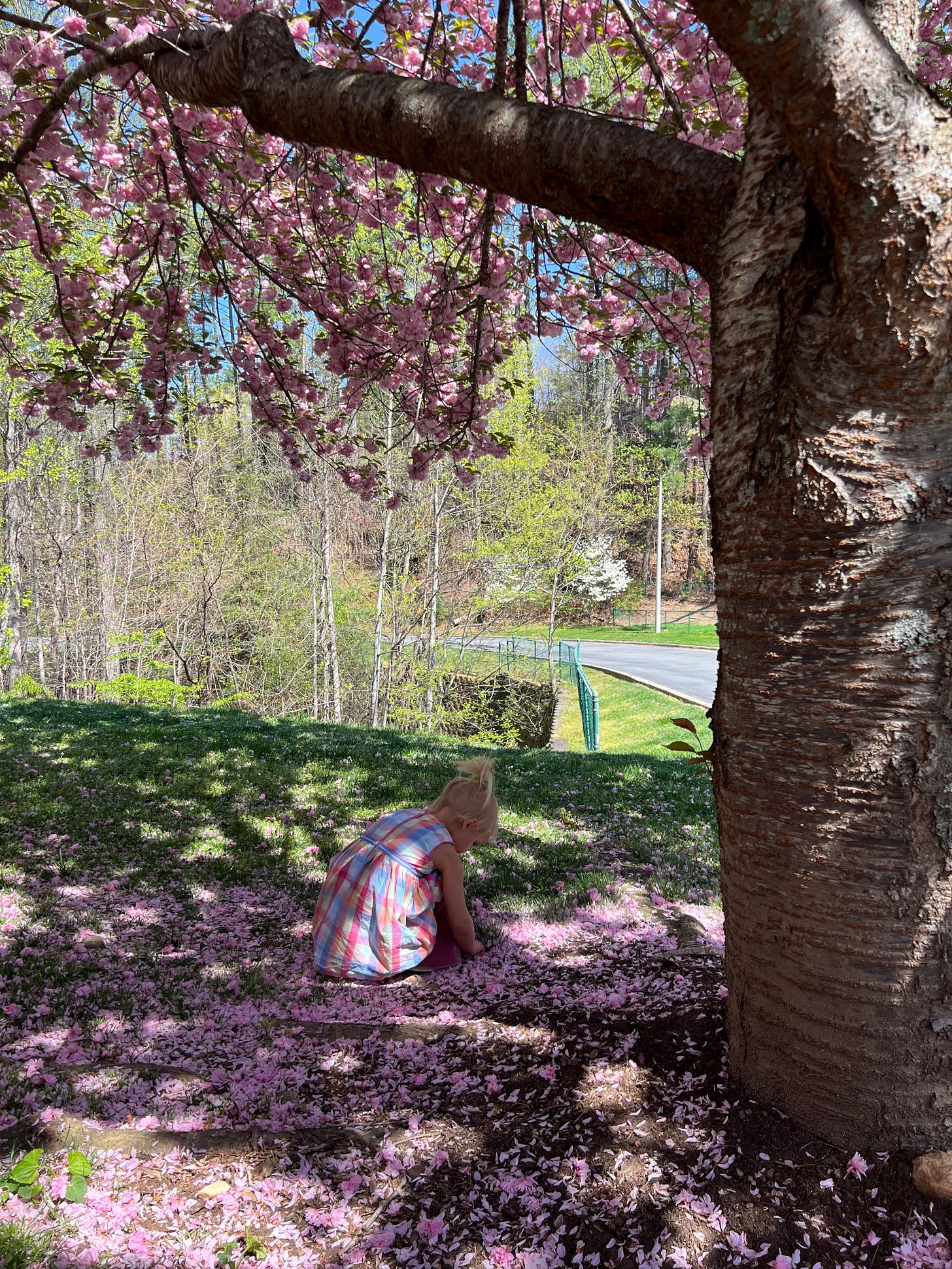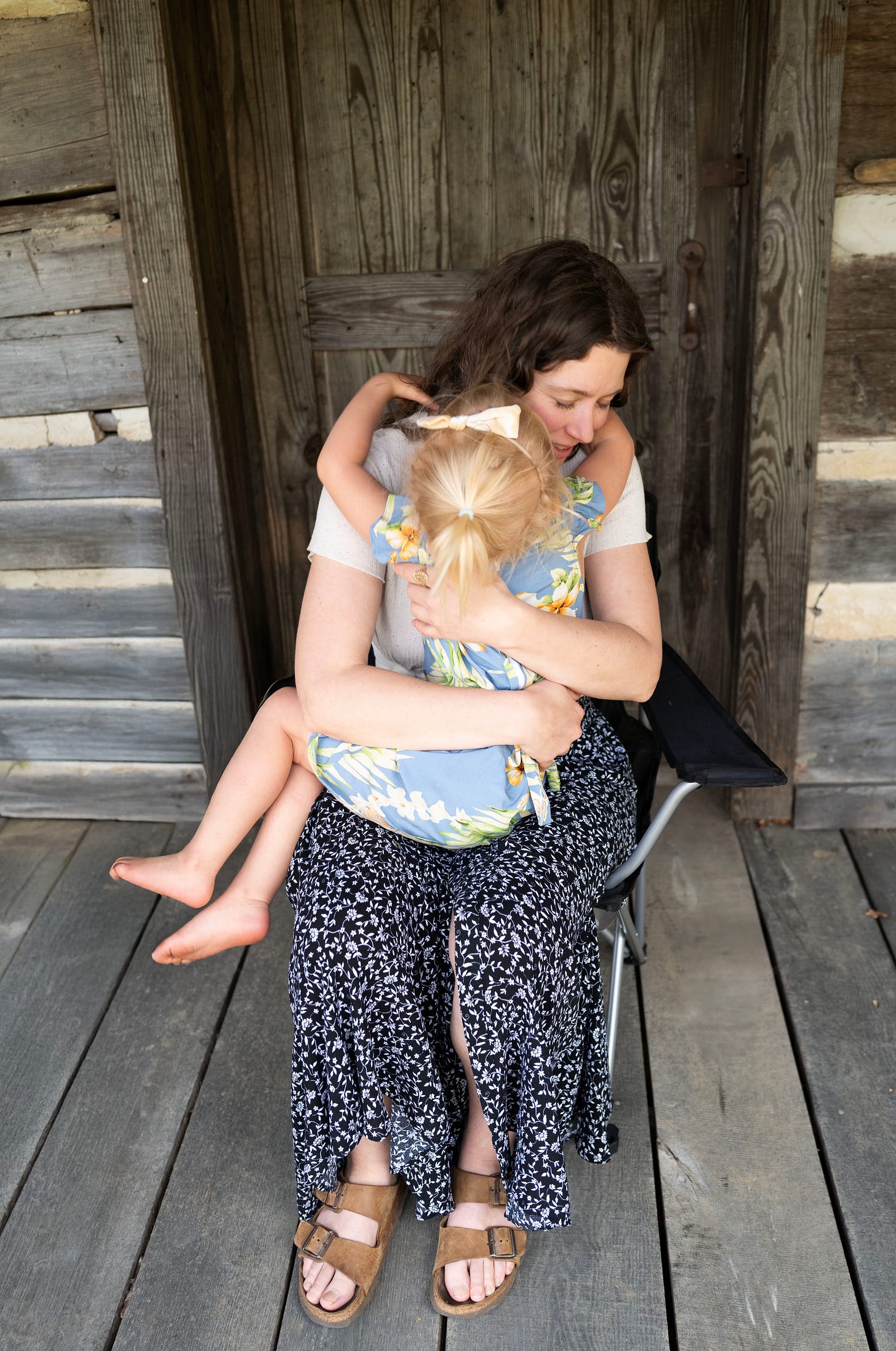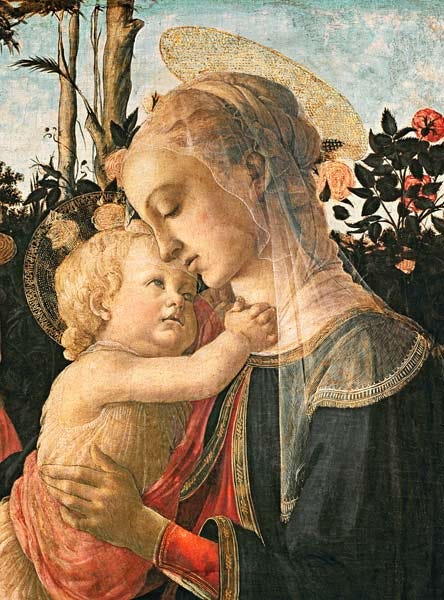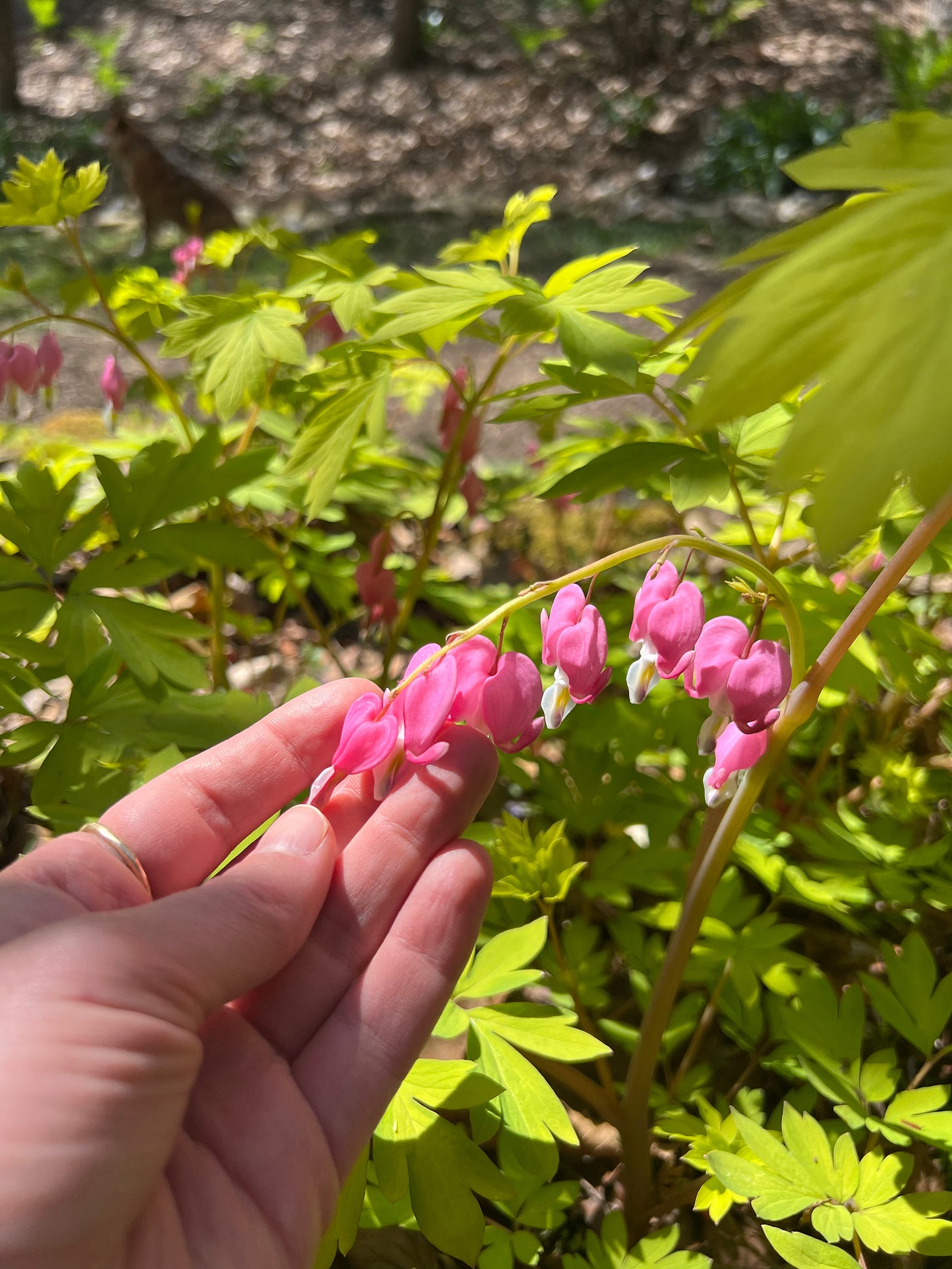Breaking Easter eggs
The sublimity of suffering
I still remember the moment it hit me, like a knee in my solar plexus.
My daughter was only a couple weeks old. I was sitting on the pink-winged armchair in the living room staring out the windows at the winter landscape. My daughter, tiny and fragile and newborn, had just fallen asleep in my arms when I realized something that instantaneously fractured my brain into a thousand shards.
My child would suffer in her life… and I could not prevent it.
I knew this, of course, in theory, long before she was born. Being alive is hard. Even in the most idyllic life there will be unexpected ruptures, fractures, losses and accidents. No matter who you are there will be times when you break, it’s unavoidable, part of the contract of being alive.
But it’s one thing to understand this as a general fact of existence, it’s quite another to hold the most precious being you could ever imagine in your arms and realize that you cannot control the unfolding of their lives.
I struggled, profoundly at first, with this. Postpartum is a powerful cocktail of hormones, emotions, and psychic openings. It is, to this day, the most potent and prolonged psychedelic I’ve ever experienced.
And so even though I tried to rationalize the sheer normalness of suffering in my logical mind, the deeper recesses of my brain were spinning to comprehend—not only would my child suffer in this life, she would probably suffer in ways I can’t imagine, ways that aren’t familiar to me.
Or, perhaps even worse, ways that are.
After she as born, I was haunted by intrusive thoughts for a whole year. Reoccurring scenes of my worst nightmares flashing across my mind many times a day. I have a lot to say about postpartum OCD, and will share more in a future essay, but looking back now I see one of the biggest factors of these cut-glass thoughts was this— I could not imagine how to survive my child’s suffering.
And so that’s what my brain tried to do, imagine it, again and again and again.
I used to hate the word “suffering.” It recalled monks in horse hair robes, self-flagellating through the streets.
I scented a glorification inside the word that made me grimace.
Don’t we have enough pain in existence without martyring ourself to its presence?
But I feel differently about suffering now. Parenting, in part, made me feel differently about it.
Suffering is just another word for the specific intensity of being human, of being alive. And it’s only through being alive that we can touch that thing we’re always reaching for, the thing some call “the sublime.”
Being with suffering is a skill. Perhaps one of the greatest skills we’ll learn in a lifetime. One our children come, in part, to teach us.
And one that it is the greatest task of our lifetime to learn, so we can teach it to our children in turn.
Last week was Easter. While I didn’t grow up in much of a religious family, I did attend Quaker meeting on occasion, cracked open the bible once or twice, and was familiar with the Christian story of Easter, of Jesus dying on the cross and being resurrected from the tomb. Growing up, I preferred to shunt the obvious violence of this story to the back of my brain, along with all the visceral iconography of this suffering in some of my friend’s churches.
It’s only as an adult, and as a mother, that I’m able to embrace the fullness of this story. Not just the pain of a man choosing to suffer for the healing of humanity. But the unseen pain of the mother, enduring the immense suffering of a child who came to take on the hurt of the world.
I remember learning, as an adult, about the moment where the angel visits Mary and asks her if she would carry the son of God. She is shown what that means, and she says yes.
What bravery, what profound bravery, I thought, in saying yes to this. To say yes, knowing your child is coming in help heal the world, but will have to experience profound pain to do so.
And yet, is this not what each one of us does as a mother?
We know what life is.
We know what life can do to you.
We know the beauty and the pain, and still, we say yes.
We say yes to bringing a child into the world even though we know we will have to endure their pain. Even though we know, for them to fulfill their soul’s assignment in this world, they will necessarily have to experience pain. It’s part the deal of embodiment, a texture as unavoidable as the dark obsidian of nightfall.
And still, we say yes.
Is there anything more powerful in the world?
As soon as I found out I was pregnant a chronic pelvic pain condition I had had in my early twenties came back. I knew why it did, it was obvious. I had lost a baby six months prior, and I was terrified I would lose one again.
But even knowing why it was manifesting didn’t prevent it from happening.
It has been almost four years now since I started this new cycle with chronic pain. I’ve had ups and down, stretches of days, sometimes even weeks, when I have no pain at all. And I’ve also had deep, dark weeks of flares ups, months of wondering if I’ll ever know what it’s like to not be in pain again.
I find chronic pain intensely interesting.
Not just because it’s been such a big part of my life experience, but because research now shows that most chronic pain is neuroplastic, meaning that it’s presence is the byproduct of—not tissue injury—but your brain and nervous system.
Pain is how our brain signals danger. A broken bone hurts because our body is saying “be careful with this arm, don’t move it too much.”
So, when we have pain in the absence of injury? It’s an indicator that our brain and nervous system are perceiving danger when, in fact, there may be none.
I’ve learned so much about chronic pain in my life, but the thing that most stuns me is the increasingly compounding evidence of how to heal it.
To stop creating this kind of pain, we need to stop being afraid of the pain itself.
Instead of pulling away from it, or trying hard to change it, we just need to be with it. This is what resets the way our brain and our nervous system reacts to our own body. It’s a kind of real-life neural magic trick that works to rewire our brain and our experience of pain itself.
Or another way of putting it— the antidote to suffering is to feel it.
It’s a powerful, wild, potent brew. To feel our own suffering, and by feeling it, transform it. And yet, it’s one of the most impactful things we could ever do—for ourselves, for our children, and for the world they are growing up into.
A lot of the cultures we grew up in were formed—like a grape vine trained to a trellis—to avoid feeling pain. To manufacture a life in which we prevent suffering at any costs (“be careful!”) or to export the suffering in any way we can (“it’s this persons fault”).
And yet, the skill that will see our children through the deep journey of being in this world is not how to avoid suffering—because, the truth is, it’s unavoidable—but how to be with the pain.
Be with it so completely, that it begins to transform into something else.
Things shifted, dramatically, in my body and psyche when I started practicing this. It also changed my relationship with my daughter. She was colicky as a baby, and has been “high spirited” her entire life. We all endured a lot of suffering in the beginning. But I’ve noticed as she’s gotten older, and I’ve gotten better at simply being with her, and my own self, when it hurts, that she calms down much quicker, reaching peace, regulation and confidence inside herself faster than I could have ever imagined before.
Some days it has me wondering…how much could I have been different, in the beginning, if I had simply known how to be with her suffering?
What changes in the world when we teach children not to be afraid of pain? But to know how to meet it? How to companion themselves on the journey of being human?
Because when we teach our children how to meet pain, we teach them how to meet life. How to love life. Not because it’s always what they want it to be, but because it is a thing of many colors and textures, a thing of rough waters and ecstatic understandings, a thing we get to experience.
I think of the trickster astrologer Caroline Casey, and how she writes of trauma as our “beautiful, dangerous assignment”.
There is danger in encountering pain, in being exposed to the hardship of life, but there is also the assignment. Our assignment. The reason why we came.
If I could pray that my child would reach adulthood knowing one thing, it would be this—to not be afraid of life. To not be afraid of her depths. To not to be afraid of change, endings or loss.
Because on the other side is her destiny. On the other side is becoming.
On the other side of breaking is resurrection.
A week after Easter, and our daughter still wants to hunt for Easter eggs in the garden. I fill them up with simple little sweets and set them out for her to find in rock crevices and under trees. She collects them gleefully in a basket, breaking them open while she swings her legs from the porch.
She doesn’t know what all this means, not yet.
But as she cracks each one open to find what’s inside, I think a part of her understands.
Life will break you.
But if you stay with the pieces, unbearable sweetness will meet you on the other side.







Oh my word. This is just one of the, if not THE most resonant expression about the motherhood initiation I have ever read. I cannot tell you how very much this touched my heart. Thank you thank you thank you for your beautiful words and luminous heart.
Reading this while feeding my 12 week old daughter. Yes, I'm crying. Beautiful words reflecting a lot of what I'm feeling and haven't quite found my own words for yet. Thank you.